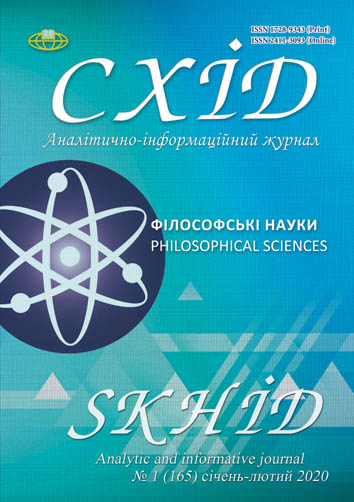Metaphor as a development factor of the network society
DOI:
https://doi.org/10.21847/1728-9343.2020.1(165).222820Keywords:
network theory, network society, metaphor, metatheoryAbstract
The formation of the methodological apparatus of network theory has been shown and the role of metaphor in the network society has been investigated to identify changes in reality and the emergence of new knowledge or a new variant of knowledge. It has been determined that thanks to metaphors, the paradigm of description of contemporary society has changed, which is now characterized as “network” or “web”, “flowing”, “dynamic”, “uneven” etc. The most famous attempts of such a description are the concept of new sociality by Z. Bauman and the actor-network theory by B. Latour. The latter allows considering the metaphor at the epistemological level of knowledge, i.e. in the processes of social construction. In this case, metaphors are used to build various kinds of metatheories that combine ways of substantiating and structuring knowledge about society, as well as determine the logical correlation of the main elements of analysis. An analysis of R. Haeussling’s network concept is given as an illustration of such possibilities of metaphor.
Downloads
References
Bauman, Z. (2008). Tekuchaya sovremennost (translat. from English). St.Petersburg: Piter, 240 p. (In Russian)
Capra, F. (2002). Pautina zhizni: Novoye nauchnoye ponimaniye zhivykh sistem. Moscow: Gelios. Retrieved from http://awake.kiev.ua/system/kapra.htm (In Russian).
Collins, R. (2002). Sotsiologiya filosofiy: globalnaya teoriya intellektualnogo izmeneniya (translat. from English). Novosibirsk. (In Russian).
Collins, R. (2009). Chetyrie sotsiologicheskikh traditsii (translat. from English). Moscow, 320 p. (In Russian)
Deleuze, J. & Guattari, F. (2010). Tysiacha plato. Kapitalizm i shizofreniya (translat. from English). Yekaterinburg, 895 p. (In Russian)
Durkheim, E. (1954). The elementary Forms of the Religions Life. Glencoe, P. 230-231.
Haeussling, R. (2003). Sotsiologicheskiye esse po osnovnym aspektam setevoy teorii (translat. from English). Мoscow, 192 p. (In Russian)
Lakoff, J. & Johnson, M. (2004). Metafory, kotorymi my zhivem. (translat. from English). Moscow: Yeditorial URSS, 256 p. (In Russian).
Latour, B. (2006). Novogo vremeni ne bylo. Esse po simmetrichnoy antropologii (translat. from Franch). St.Petersburg: Izd-vo Yevrop. un-ta v S.-Peterburge, 240 p. (In Russian)
Simmel, G. (1996). Kak vozmozhno obshchestvo? (translat. from English). In: Izbrannoye. Vol.2. Moscow. 607 p. (In Russian)
Sivokon, A.S. (2016). Set: ot metafory k ontologicheskoy konstante. Izvestiia Saratovskogo universiteta. Seriia Filosofiya. Psikhologiya. Pedagogika. 1. Retrieved from https://cyberleninka.ru/article/n/set-ot-metafory-k-ontologicheskoy-konstante (In Russian)
Vasilkova, V. V. (2012). Seti v sotsialnom poznanii: ot metafory k metateorii. Zhurnal sotsiologii i sotsialnoy antropologii. № 5 (15). Retrieved from https://cyberleninka.ru/article/n/seti-v-sotsialnom-poznanii-ot-metafory-k-metateorii (In Russian).
Downloads
Published
How to Cite
Issue
Section
License
Copyright (c) 2020 Maria Schnitzer

This work is licensed under a Creative Commons Attribution-NonCommercial-NoDerivatives 4.0 International License.
1. Authors bear responsibility for the accuracy of facts, quotations, numbers and names used.
2. Manuscripts are not sent back.
3. The publisher does not always agree with the authors' opinion.
4. The authors reserve the right to authorship of the work and pass the first publication right of this work to the journal under the terms of a Creative Commons Attribution-NonCommercial-NoDerivatives 4.0 International License. This license allows others to distribute (copy) the published work for non-commercial purposes, provided there is mandatory attribution to its authors and a link to the first publication in our journal.
5. The authors have the right to conclude separate supplement agreements that relate to non-exclusive work distribution in the form in which it has been published by the journal (for example, to upload the work to the online storage of the journal or publish it as part of a monograph), provided that the reference to the first publication of the work in this journal is included.

